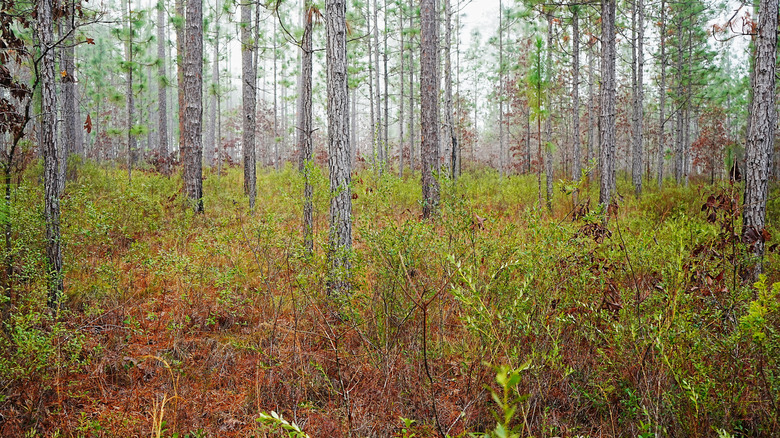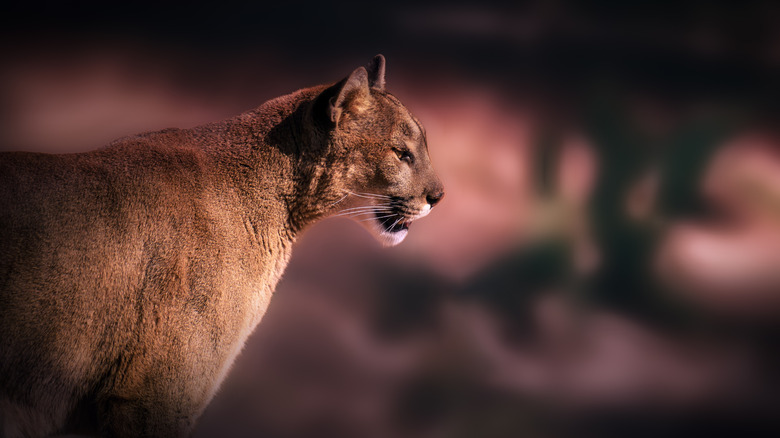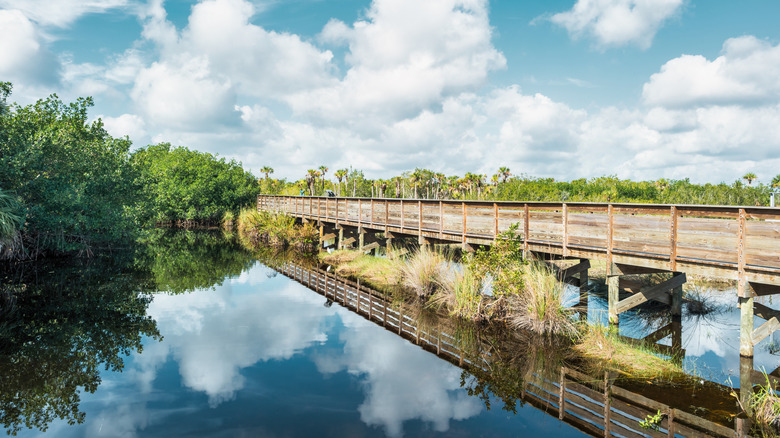Florida's Under-The-Radar State Forest In Naples Hides Incredibly Rare Wildlife And Recreational Thrills
What was once intended to be an enormous residential neighborhood is now a peaceful Southwest Florida state forest that serves as an important piece of the ecological puzzle that makes the complex Everglades hydrological system function. Today, Picayune Strand State Forest is a nearly 75,000-acre stretch of wild land that offers visitors stellar birding and wildlife-watching opportunities, and miles of equestrian and hiking trails. This wild country is just two miles from the city of Naples, home to a hidden Gulf Coast beach park with a scenic boardwalk and soft white sands. It's also less than an hour by car from Fort Myers and Southwest Florida International Airport.
In the 1940s and 1950s, developers drained the swamps of the forest and platted out a massive subdivision. It became the site of the "swamp land in Florida" land scam because, try as they might, developers could never keep the forest land dry during the rainy season, and it proved impossible to build homes on the land. In the 1970s, after giving up on the idea of a residential development, it became obvious that the drained swampland was having a negative impact on the region's hydrology and wildlife.
Between 1985 and 1995, the state purchased the entire planned development and named the land the Picayune Strand State Forest. Today, it's Florida's fourth-largest state forest and the site of important restoration efforts to improve and restore the hydrological function of the Florida Everglades as the "river of grass" that flows south toward Florida Bay.
Picayune Strand, a birding and wildlife paradise
For visitors who want to take in the natural beauty of southwest Florida and catch a glimpse of the region's birds and wildlife, Picayune Strand State Forest is an excellent choice where they can find solitude among nature. The forest is home to bald eagles, rare red-cockaded woodpeckers, wood storks, and a host of other wading birds.
For those seeking quiet opportunities to view more charismatic wildlife, Picayune Strand is home to black bears and endangered Florida panthers. American alligators swim its dwarf cypress swamps, and foxes, bobcats, wild hogs, and white-tail deer are found here, too. An unwelcome animal, the invasive Burmese python, is also found in the forest, and wildlife managers are working to remove these exotic reptiles through a unique program that uses electronically tagged "scout snakes" to find other snakes and snake nesting areas.
For equestrians, the forest features the 22-mile Belle Meade Horse Trail, and there are 30 paddocks available for horse owners to safely keep their animals on overnight trips. For hikers, the forest is a serene escape that features the Sabal Palm Trail that winds its way through 3.2 miles of pine flatwood forest, where hikers might catch a glimpse of a rare eastern indigo snake, the largest native snake in North America that can grow to lengths of nine feet. Mountain bikers can ride over a fairly significant number of roads (remember, the forest was initially platted as a subdivision), and campers, for a fee, can choose among a handful of primitive tent and RV sites. The forest is easy to get to — its northern border is Interstate 75, also known as Alligator Alley, where visitors can take a journey through one of the most important ecosystems in the world.
Part of the important Everglades ecosystem
Picayune Strand State Forest is part of a much larger ecosystem that drains almost all of South Florida through the venerable Florida Everglades. It is part of the Big Cypress Basin, which is also home to Fakahatchee Strand Preserve (pictured here) and Big Cypress National Preserve, one of Florida's only spots where the Milky Way can be seen without a telescope. All are part of the important Everglades hydrological system that includes more than 2 million acres of South Florida.
Visitors who want a more complete experience have lots of choices for getting out into this wild and watery landscape. Adjacent protected areas include the Florida Panther National Wildlife Refuge just to the north of the state forest. While the bulk of this refuge is closed to human encroachment to protect this fragile population of big cats, visitors can learn about the habitat these endangered animals need to survive and thrive by hiking two trails at the south end of the refuge. The trails offer great opportunities to see wildlife, and they're popular with birders and wildlife photographers.
Other public lands in the area that do offer access to this special corner of southwest Florida include Fakahatchee Strand Preserve State Park and Ten Thousand Islands National Wildlife Refuge. All of these parks and preserves join with the larger Everglades National Park, which, by itself, protects about 1.5 million acres of wild habitat. In all of these parks and preserves, visitors can revel in the unique landscape that is so vital to the people, history, and culture of South Florida. If a visit to this corner of the Sunshine State is on the bucket list, a stop at Picayune Strand State Forest is a great place to start.


